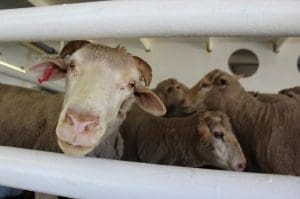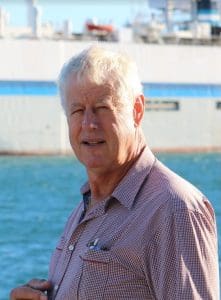 CONSULTATION on a draft report on heat stress risk assessment for live sheep exports from Australia has been extended by a month as producers lobby over the implementation of the report’s main recommendation.
CONSULTATION on a draft report on heat stress risk assessment for live sheep exports from Australia has been extended by a month as producers lobby over the implementation of the report’s main recommendation.
Minister for Agriculture David Littleproud said yesterday consultation on the Heat Stress Risk Assessment (HSRA) draft report will be extended to 1 March 2019.
The HSRA panel has recommended that the heat stress risk assessment framework focus on animal welfare, rather than mortality risk, using a wet bulb temperature welfare limit for exported sheep based on weight, breed, condition score, acclimatisation, fibre length and where they are sourced from.
The panel’s recommended wet bulb temperature welfare limit is 28°Celsius for a standardised shipper sheep – a 56 kg adult Merino wether, body condition score 3, zone 3, winter acclimatised and recently shorn. The panel has recommended that the heat stress assessment model should use a 98 percent probability that the deck temperatures the sheep would be exposed to during a planned voyage would remain at or below the wet bulb temperature welfare limit.
WA sheep producers concerned at export implications

PGA president Tony Seabrook
Western Australian sheep producers have claimed implementation of the HSRA report’s recommendations could mean an annual 6-8 month ban on live sheep exports.
Pastoralists and Graziers Association president Tony Seabrook last week said it is incredulous that on an issue that substantially impacts on the WA regional economy that the Coalition Government is trying to rush through its HSRA regulations over the summer break, with no proper consultation period, and no regulatory impact statement.
“The subject of heat stress risk is an extremely complex issue, and its outcomes have a direct impact on farmers’ sheep production practices, yet there is little consideration or leeway given to extending the consultation period, or allowing for a phasing in of the new regulations.
“In addition, the regulatory impact statement, which is a legislated requirement on any new regulation under the Australian Government’s policy framework, will not be completed until after the HSRA regulations are implemented, and the economic impact of these new controls on the WA sheep industry will not be properly considered.
“This means that under the HSRA plan an immediate four month ban will be placed on sheep exports during the northern hemisphere summer months, with the strong likelihood that this could be extended to six or possibly eight months under the proposed modelling.”
Mr Littleproud said it was important all stakeholders had a chance to give detailed, considered feedback.
“The industry asked us to move to a model based on animal welfare rather than just comparing how many sheep die on each voyage, so we’re doing that calmly and decisively.
“The Heat Stress Risk Assessment review was done by a panel of experts in animal welfare, including heat stress physiology, with expert input from the Australian Maritime Safety Authority on ship ventilation,” Mr Littleproud said.
“The recommendations in the draft report are significant and its sensible to give stakeholders more time to provide well thought out and researched submissions.
“Submissions to the draft report will be considered by the panel as it finalises its report and recommendations to the independent regulator of live exports, the Department of Agriculture.
“Interim arrangements for the coming northern summer can be considered once the submission period has ended.”
Stakeholders can provide their feedback to the draft report via the ‘Have Your Say’ platform at http://haveyoursay.agriculture.gov.au/hsra-review



HAVE YOUR SAY